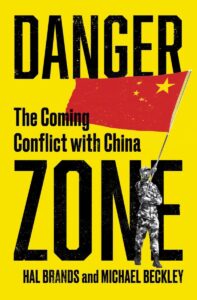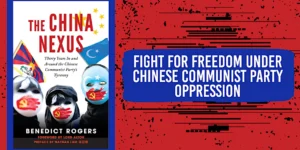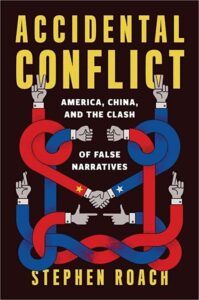China’s A4 protests have “far exceeded” the Democracy Wall Movement of which Wei Jingsheng was a leading figure in the late ’70s, he tells Matt Pottinger, chairman of The Foundation for Defense of Democracies’ China Program and a Distinguished Visiting Fellow at Stanford University’s Hoover Institution.
“The White Paper Revolution severely undermined Xi Jinping’s confidence. After the 20th Party Congress, Xi Jinping had come to monopolize power at the center and was feeling smug,” adds Wei (above), a recipient of the National Endowment for Democracy’s 2008 Award. “But the slogan for Xi Jinping to step down, put forward by the White Paper Revolution, is comparable to the question I raised at the Democracy Wall Movement: Do we want democracy or a new dictatorship?”
Ideological imperative
 To grasp the Chinese challenge, we must grasp its ideological dimensions, say analysts Michael Beckley and Hal Brands, co-authors of Danger Zone: The Coming Conflict with China. If Woodrow Wilson and his followers wanted to make the world safe for democracy, the PRC’s rulers want to do the same for autocracy. For them, autocracy is not simply a means of political control or a ticket to self-enrichment, but a set of deeply held ideas about the proper relationship between rulers and the masses, they write for the Journal of Democracy:
To grasp the Chinese challenge, we must grasp its ideological dimensions, say analysts Michael Beckley and Hal Brands, co-authors of Danger Zone: The Coming Conflict with China. If Woodrow Wilson and his followers wanted to make the world safe for democracy, the PRC’s rulers want to do the same for autocracy. For them, autocracy is not simply a means of political control or a ticket to self-enrichment, but a set of deeply held ideas about the proper relationship between rulers and the masses, they write for the Journal of Democracy:
A strong, proud China might still pose problems for Washington even if a liberal-democratic government held sway in Beijing. That China is ruled by autocrats committed to ruthlessly suppressing liberalism at home turbocharges Chinese revisionism globally. A deeply authoritarian state can never feel secure in its own rule because it does not enjoy the freely given consent of the governed; it can never feel safe in a world dominated by democracies because liberal international norms challenge illiberal domestic practices.
“Autocracies,” writes China scholar Minxin Pei, “simply are incapable of practicing liberalism abroad while maintaining authoritarianism at home.”
 China’s Communist Party has never hidden its hostility to the liberal values that underpin the US-led world order, though that antipathy has acquired increased openness and confidence under Xi, adds Bloomberg’s Matthew Booker. For Europe, witnessing the largest military conflict on its soil since the end of World War II, China’s de facto support for Russian aggression gave a new level of reality to that clash of values. And yet……
China’s Communist Party has never hidden its hostility to the liberal values that underpin the US-led world order, though that antipathy has acquired increased openness and confidence under Xi, adds Bloomberg’s Matthew Booker. For Europe, witnessing the largest military conflict on its soil since the end of World War II, China’s de facto support for Russian aggression gave a new level of reality to that clash of values. And yet……
In a period when liberal democratic political systems have been riven by radical polarisation, lack of consensus, hostile party politics and rampant inequality, China claims to offer technocratic “benevolent authoritarianism” as an alternative, notes Sean Golden with the Barcelona-based CIDOB think tank.
 A leading CCP intellectual, Wang Shaoguang, argues that unlike Western liberal democracy, “what Chinese sages focused on … was not the form of government or the form of the political system, but rather the way of government or the goals and methods in the functioning of the political system”. He distinguishes between:
A leading CCP intellectual, Wang Shaoguang, argues that unlike Western liberal democracy, “what Chinese sages focused on … was not the form of government or the form of the political system, but rather the way of government or the goals and methods in the functioning of the political system”. He distinguishes between:
- “formal” democratic governance (“there are some political systems that, in terms of form, because they use competitive elections, appear to be ‘representative,’ yet their responsiveness may not be very high”) and
- “responsive” governance (“there are some political systems without multi-party elections but which are quite responsive to the people’s demands”).
But in the light of recent events, the claim of today’s version of ancient Chinese despotism to rule more competently than messy democracy lies in tatters, the FT’s Martin Wolf observes.







